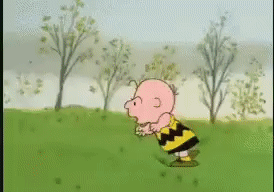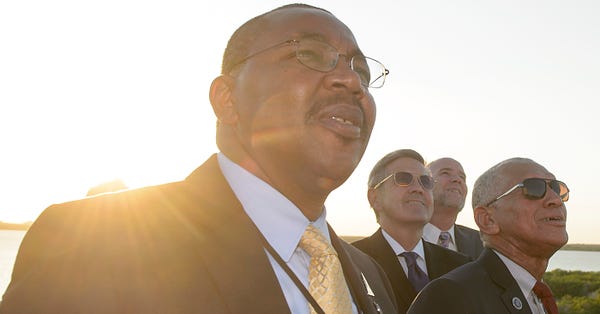Two pieces of news this past week spoke to humankind traveling in different directions. On one hand, with severe weather once again gripping the planet and the dangers of our warming world becoming more apparent, present, and urgent, the infuriating antics of West Virginia Senator Joe Manchin dashed the hopes of Democrats yearning for meaningful action on climate change. As many have noted, Manchin has been playing his game of Lucy and the football (from the classic comic strip "Peanuts") since the beginning of this 50-50 Senate. Just when Democrats seem close to scoring a policy goal, he (either single-handedly or abetted by Arizona Senator Kyrsten Sinema) pulls the ball away, driving a stake into core objectives supported by vast majorities of the party — and often even by the country as a whole.  mary ☮️ @marynasca60 mary ☮️ @marynasca60 July 15th 2022 4 Retweets14 LikesIt's gotten to the point where, as we noted recently, the rallying cry for Democrats in the midterms has become some version of, "give us two more senators." Of course, the frustration with Manchin isn't new. At the same time, we would do well to remember that the blame is not his alone. The filibuster, employed in its current state by Mitch McConnell, creates a dynamic that blocks meaningful action and provides a smokescreen on accountability. As we considered in a piece titled "More Than Manchin" over a year ago: "By focusing so much attention on Manchin, we are not presenting the full narrative to the American people. The press is framing this as a fight within the Democratic Party. That lets Republicans waltz by the microphones and cameras without paying nearly enough of a political price for their cynicism and obstructionism." While all this remains true, the latest sucker punch from Manchin, who seems to treat good-faith negotiations like a private joke in which only he knows the punchline, hits particularly hard. The specter of our climate crisis hangs over this Earth with foreboding uncertainty. We know it is already bad. We don't know how bad it might get (a lot depends on what we do know). Or whether we will find a way to remediate some of the damage. It's an existential crisis, particularly for younger generations who feel it acutely and wonder, as we all should, about the health of the planet they will inherit. It is difficult to discern exactly what is motivating Manchin on this issue, but many have noted how he has benefited politically and personally (in terms of his net worth and campaign support) from his ties to the oil, gas, and coal industries. Money talks, but it is also temporal. Focusing on short-term gain at the expense of the future and the needs of others encapsulates the struggles our planet faces. Solutions require planning, rethinking, and perhaps foregoing what is easy now for what is necessary later. Although as we see, the "later" is already NOW with climate. What fixing the planet also requires is science. For all that is going wrong, we should find some hope in the fact that a global team of scientists over the last several decades has put together a picture of the precariousness of our climate that allows us — should we heed the data — to see what is happening and prepare for what needs to be done. New forms of energy and ideas for greater sustainability can help us reexamine our assumptions and reframe our perspectives. With this truth in mind, let us reflect on another news story from the past week that, as hinted at the top of this piece, points us in a different direction. The pictures coming from NASA's James Webb Space Telescope have inspired the world. That we are looking back from our little home, only a speck in the vastness of space — what the astronomer Carl Sagan famously called the "pale blue dot" — at the origins of the universe is hard for most of us to comprehend. The images force us to reconsider our senses of time and space. In this framing, the workings — or more accurately, the dysfunction — of our Senate do not mean anything. Our planet itself, in but one solar system of but one galaxy, is of no consequence except to those of us who call it home. The notion that, amid the universe's vast expanse, we are the only planet of life also seems unlikely.  NASA Webb Telescope @NASAWebb NASA Webb Telescope @NASAWebb July 11th 2022 97,224 Retweets381,656 LikesIn order to access these images, in order to allow science to open up our cosmos and the mysteries of life, we need people who can make it happen. And it was a welcome addition to coverage of the Webb telescope that more of us got to know about Gregory Robinson, the NASA administrator who put the troubled project back on track. Robinson, "the ninth of 11 children born to tobacco sharecroppers in rural Virginia," offers an inspiring American story.  NPR @NPR NPR @NPR How the son of sharecroppers helped send the world's most powerful telescope to spaceGregory Robinson grew up as one of 11 children of tobacco sharecroppers in rural Virginia. He reflects on his journey to NASA, where he directed the groundbreaking James Webb Space Telescope program.n.pr How the son of sharecroppers helped send the world's most powerful telescope to spaceGregory Robinson grew up as one of 11 children of tobacco sharecroppers in rural Virginia. He reflects on his journey to NASA, where he directed the groundbreaking James Webb Space Telescope program.n.prJuly 15th 2022 226 Retweets967 LikesIn journalism, sometimes you look for juxtapositions to help provide context for the moment — as if by choosing two events, or people, or trend lines to compare, you can allow for greater clarity on both as well as a sense of the larger picture. Pairing Manchin and the Webb telescope provides, I think, an important perspective and hopefully some sense of hope. There is a battle in this country, and in the larger world, between ignorance and knowledge, cynicism and hope. This is not new. These frictions always exist in human society. It is oftentimes too easy to focus on all that is wrong, for that provides the greatest danger and the most urgent need for action. But we would be wise to not lose a sense of balance, and of all those pushing against degradation and loss — people like Gregory Robinson. We can look up — at the cosmos and at our own futures — to find the inspiration to keep going. In the end, it is better to bet on the helpers more than the obstructionists, the builders more than the destroyers, and the dreamers more than the cynics. Thanks for subscribing to Steady. This post is public, so please feel free to share it. © 2022 Dan Rather |
Providing accurate and timely information about what matters in Franklin, MA since 2007. * Working in collaboration with Franklin TV and Radio (wfpr.fm) since October 2019 *

